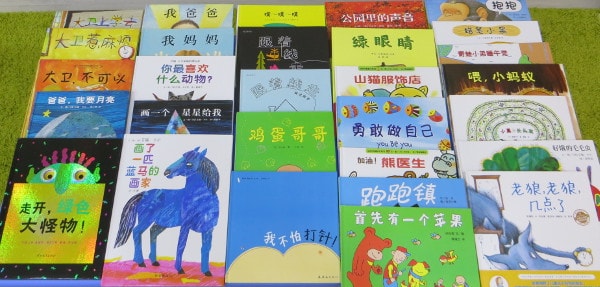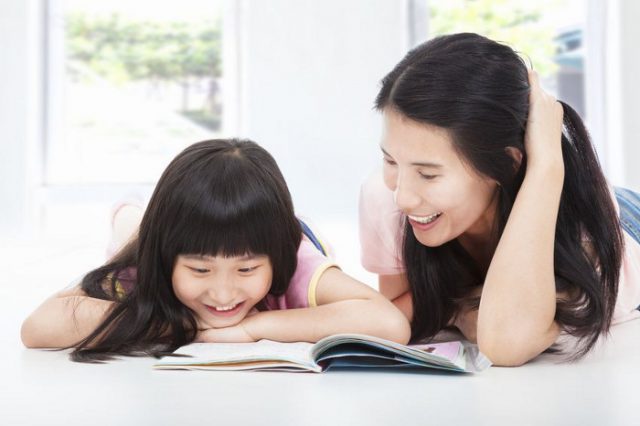In Singapore’s bilingual society, parents play an important role in creating a conducive environment for children to use and live the Mandarin language. Yet, many may be at a loss on how to get their young children interested.

Reading, listening and practising are important habits to form. I encourage parents to participate in activities like the Family Talent Competition or the My Story Public Speaking Competition organised by the Speak Mandarin Campaign, to challenge themselves to truly be engaged in speaking Mandarin!
As part of the Speak Mandarin Campaign, I often conduct storytelling sessions for children of all ages and have come to realise how effective it is in piquing their imagination and helping them to immerse and think in the language.
Here are some quick tips for parents to become better storytellers and to build your child’s enthusiasm in Mandarin.
Choosing the right books
There are many aspects of storytelling that parents can work on. To start, the most important step is choosing the right books. In general, books with colourful images and interesting visuals are the easiest to work with as they capture children’s attention instantly.
In terms of content, I would recommend choosing storybooks that centre around animals for children below Primary 3. Often, cheeky and fun books that focus on animals as their main subject encourage children to use their imagination and make the session more engaging.

If animals don’t seem to work well with your little one, perhaps, try those that feature food. From my experience, most children are drawn to books that feature food items or characters!
To go one step further, Chinese stories like Water Margin《水浒传》,Romance of the Three Kingdoms 《三国演义》,and Journey to the West 《西游记》 are all good titles with historical references that expose children to Mandarin using cultural elements. These are best for children in Primary 3 and above.
Using the right tone and movements
With the right books, it is now up to your storytelling skills to sustain your child’s attention. Remember, it doesn’t matter if the storytelling is done by you or your spouse – what matters is how it is being done. As storytellers, our tone and our movements make a world of difference. In general, remember to target the five senses as much as possible.
Other than pictures, actions mimicking the characters can help your children visualise the story while using different intonations of your voice makes the story real and more engaging.

The younger your child, the more varied your voice needs to be during storytelling. Think of making them feel something for the story – be it excitement, fear, or curiosity, rather than simply hearing a voice or looking at a picture. You can also choose to use props such as a toy plushie to retain their attention.
Storytelling in a conducive environment
Lastly, like any other activities you engage in with your children, the time and place play a part in getting their attention. I would recommend conducting storytelling sessions at night when they are less active and more settled.
Set aside twenty minutes before bedtime for some quality storytelling time. I like to switch off the lights in the room and leave a small lamp on for a good and calm ambience.
The ideal duration of storytelling is different for children of different ages. For starters, children aged five years old can start with five minutes of storytelling time. Over time, their attention span can be trained to reach half an hour.
Taking turns to tell stories
Ideally, storytelling should be done every day. After consistent storytelling sessions, what you may realise is that children can memorise and regurgitate the stories that you tell them in the same manner!
Encouraging children to be the ones telling stories makes them more involved and creates an immersive environment for them to practise and use the language. Hopefully, these simple tips will help bring out the storyteller in you and from there, get your little ones more interested in Mandarin!
By Priscilla Wong.
Co-founder of Skylace Language School, Priscilla Wong has more than 30 years of teaching experience. She has been conducting story-telling sessions and Reading Workshops at various schools, to cultivate and promote children’s interest in reading. Ms Wong is an invited speaker for ideas on story-telling session in Singapore Centre for Chinese Language. She was also appointed by the National Institute of Education Singapore as an external trainer for Chinese language teachers on mastering story-telling techniques in 2016.
* * * * *
Stay in touch! Subscribe to our Telegram here for all our latest updates.
Like what you see here? Get parenting tips and stories straight to your inbox! Join our mailing list here.



























































Leave a Comment: